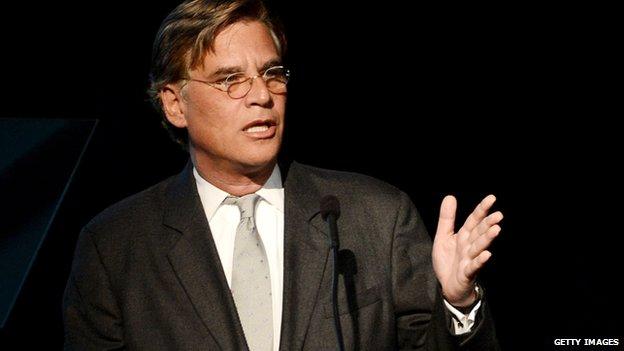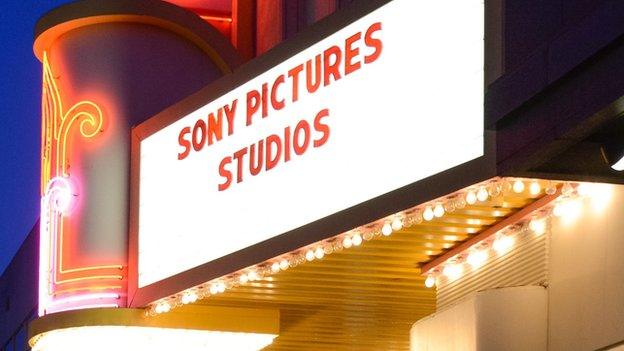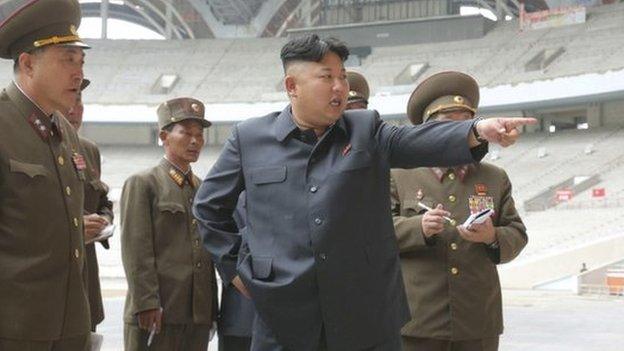Sony hacks: Sorkin says media are 'morally treasonous'
- Published
- comments

A Daily Beast article reveals Jennifer Lawrence wasn't paid as much as her male co-stars in a recent film
The messages read like something from a bad Hollywood film about Hollywood. The misbehaviour of egotistical studio executives, petulant stars and dictatorial directors seem almost too cliched to be true.
But, apparently, they are.
Major media outlets have been sifting through the voluminous trove of Sony Pictures emails made public by an anonymous group of hackers known as the Guardians of Peace for more than a week, picking out the particularly salacious details.
The resulting stories have provided a candid look at the sometimes ugly, sometimes acrimonious and often darkly amusing interactions that take place between many of the major players in the motion picture industry.
But do these articles constitute legitimate journalism or a gross invasion of privacy?
Oscar-winning screenwriter and producer Aaron Sorkin thinks it's the latter, accusing the media, external of "giving material aid to criminals".
Mr Sorkin, writing in the New York Times, notes that some of the emails that generated the most attention involved one of his writing projects, a planned biography of Apple founder Steve Jobs.
He says the "minor insults" revealed don't anger him as much as the fact that the rest of the film industry is standing silently by as sensitive information about Sony employees is exposed.
"Wouldn't it be a movie moment if the other studios invoked the Nato rule and denounced the attack on Sony as an attack on all of us, and our bedrock belief in free expression?" he asks.
He reserves the bulk of his scorn for the media, however. What they are writing about isn't newsworthy, he says, they're motivated purely by greed. Their actions, he says, make any future arguments against privacy invasions - by, for instance, the National Security Agency - empty.
"Let's just say that every news outlet that did the bidding of the Guardians of Peace is morally treasonous and spectacularly dishonourable," he says.

Aaron Sorkin says Hollywood shouldn't stand by as Sony's privacy is violated
Not everyone agrees with Mr Sorkin and Sony, which has called, external on media outlets to destroy any hacker-produced documents they may have downloaded.
Leonid Bershidsky of Bloomberg View says the journalistic ethics in this instance are "more complicated" than Mr Sorkin admits.
By publishing stories about the emails, he says, the media are performing a "socially useful act" by revealing exactly how unsafe digital information really is.
"The embarrassing media reports about Sony may bring the outlets that publish them a few thousand extra clicks, but it would be wrong to begrudge them that minor reward for telling the public an uncomfortable truth: You have been too cavalier and too trusting with your data," he says.
People need to learn to be more cautious, Bershidksy writes. If Mr Sorkin wants to discuss sensitive information with studio executives, he'd be advised to do it face-to-face.
According to, external the Poynter Institute's Kelly McBride, a number of important public-interest stories have been written about the email hacks. Buzzfeed's article, external on New York Times columnist Maureen Dowd's back-channel communications with a Sony executive is one. Bloomberg's investigation, external into Sony's interest in its employee medical records is another.
(A Daily Beast article, external on pay disparities among male and female stars and studio executives could also fall into this category.)
The main priority for journalists, McBride says, is to ensure that what is reported is accurate.
"Truth is the rudder that steers ethical decisions in journalism," she writes. "Is this information true? That's the first, but not the only question journalists ask. Does it enhance our understanding of a situation?"
Of course journalistic ethics are not a binding obligation. While they may be the concern of publications like the New York Times, the farther down the media totem pole one goes, the less interest there is in making sure the story is right from the start.
And then, of course, there's social media, where ethics are the sum total of millions of individual decisions - and the end result is usually a race to the bottom.
Even if trade publications like Variety hadn't pored over the leaked emails, users on websites like Reddit would have crowd-sourced the task, and the Hollywood's dirty laundry would have been aired all the same.
- Published2 December 2014

- Published1 December 2014
